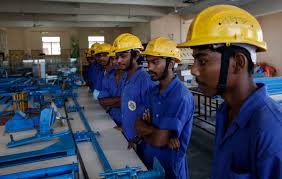India’s workforce is undergoing a transformative shift, driven by technological advancements, changing global labour market demands, and an increasing need for upskilling. As the country’s economy expands rapidly, it is uniquely positioned to address the challenges of these global disruptions while creating vast opportunities for its population. Dr Séamus McGuinness, Research Professor, Economic and Social Research Institute, and a member of the Global Labour Market Conference (GLMC) Scientific Committee, offers deep insights into how India is leading the charge in preparing its workforce for the future.
In an exclusive conversation, Dr McGuinness highlighted the significance of India’s proactive approach to upskilling. “India’s forward-thinking strategies, combined with a robust public-private partnership, are positioning the country as a global leader in workforce transformation. It is increasingly clear that the nation’s commitment to reskilling is a powerful tool not only for economic growth but for tackling the ongoing challenges of technological disruption and labour market inequalities.”
Leading in a Changing Global Labour Market
According to the GLMC’s report ‘Navigating Tomorrow: Mastering Skills in a Dynamic Global Labour Market’, India’s focus on upskilling has gained global attention, setting the country apart as one of the most proactive markets in workforce preparation. McGuinness explained, “While labour markets around the world are facing significant disparities in terms of workforce readiness, India’s approach has been particularly effective. The country’s dynamic startup ecosystem, coupled with innovative government policies, offers a model for other nations to follow as they navigate the challenges of a changing workforce landscape.”
Government initiatives like the National Apprenticeship Promotion Scheme and the Green Skill Development Programme are directly aimed at equipping individuals with the skills necessary to thrive in emerging industries, including technology, renewable energy, and artificial intelligence.
He further elabourated, “The future of work is being shaped by automation, artificial intelligence, and data science. India has recognized the need to ensure that its workforce remains adaptable, and it is investing in retraining programs that help workers transition into these high-demand sectors.”
A Global Divide in Workforce Readiness
He observed, “Global labour markets are at risk of fragmentation. Without addressing the disparities in workforce readiness, certain regions will be more prepared for the disruptions of the future, while others will fall further behind. India’s leadership in this area has the potential to bridge these gaps, offering valuable lessons to other nations facing similar challenges.”
The Role of Technology and Innovation
Technology is widely acknowledged as one of the primary drivers of reskilling across the globe. He highlighted, “Technological change is one of the most powerful forces shaping the future of work. Countries like India, which are heavily investing in technological innovation, are recognizing the importance of preparing their workforce to thrive in these new environments. Upskilling in technology-related fields will be crucial in maintaining a competitive edge in the global economy.”
India’s commitment to emerging technologies, such as artificial intelligence, big data, and automation, has created a growing demand for skilled workers. This shift is especially important as industries look for talent capable of navigating digital disruptions. The country’s tech-driven upskilling initiatives, such as partnerships with educational institutions and private companies, are helping bridge the skills gap and prepare workers for the challenges and opportunities that lie ahead.
With one of the youngest populations in the world, India has a unique opportunity to harness its demographic dividend. McGuinness stated, “India’s young, tech-savvy workforce presents an unparalleled opportunity for the country to become a global leader in innovation. By equipping this emerging workforce with the skills needed for the future, India can build a resilient economy capable of adapting to the technological challenges ahead.”
This demographic advantage also plays a role in fostering a culture of innovation and entrepreneurship. The growth of India’s startup ecosystem is fueling the demand for workers with diverse skills, particularly in sectors like software development, digital marketing, and green technologies. As the demand for new skills continues to rise, India’s ability to cultivate homegrown talent will become a key factor in its continued success in the global marketplace.
One of the key factors contributing to India’s success in upskilling is the level of trust its workforce has in both the government and the private sector. He noted, “Indian workers have shown a high level of trust in both businesses and the government when it comes to workforce development. This trust is crucial in ensuring the success of upskilling programs and fostering a collabourative environment between the public and private sectors.”
Overcoming Barriers to Upskilling
Despite significant progress, India still faces challenges in ensuring equitable access to upskilling opportunities, particularly for underserved communities. He pointed out that “Barriers such as financial constraints, limited access to training resources, and a lack of time for workers to engage in upskilling programs remain significant obstacles. Overcoming these challenges will require greater collabouration between government bodies, businesses, and NGOs to make upskilling opportunities more accessible.”
Localized approaches and innovative solutions, such as mobile training units and flexible learning models, are essential in reaching individuals in rural or remote areas. By addressing these barriers, India can ensure that all citizens have the opportunity to participate in the country’s upskilling revolution, regardless of their socio-economic background.
